-
San Francisco International Film Festival 2014
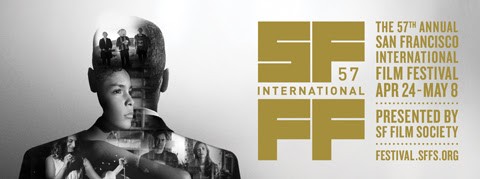
San Francisco International Film Festival 2014 April 24-May 8
The San Francisco film festival had its opening press conference and announced its full program Tuesday, 1 Apri 2014. Filmleaf links and comments thread begins HERE. Click on the logo above for that program. You can get a SFIFF 2014 online film guide HERE or a PDF file of the catalog HERE
Screeners.
Links to the reviews:
20,000 Days on Earth (Ian Forsyth, Jane Pollard 2014)
Abuse of Weakness (Catherine Breillat 2013)
Amazing Catfish, The/Los insólitos pesces gato (Claudia Sainte-Luce 2013)
Bad Hair/Pelo malo (Mariana Rondón 2013)
Child of God (James Franco 2013)
Club Sandwich (Fernando Eimbcke 2013)
Dear White People (Justin Simien 2014)
Double, The (Richard Ayoade 3014)
Dune, The/La dune (Yossi Aviram 2013)
Eastern Boys (Robin Campillo 2014)
Freedom Summer (Stanley Nelson 2014)
Happiness (Thomas Balmès 2014)
Harmony Lessons (Emir Baigazin 2013)
Heaven Adores You (Nikolas Dylan Rossi 2014)
History of Fear (Benjamin Naishat 2013)
If You Don't, I Will (Sophie Fillières 2014)
Last Weekend (Tom Dolby, Tom Williams 2014)
Manos Sucias (Josef Wladyka 2014)
Mary Is Happy, Mary Is Happy (Nawapol Thamrongrattanarit 2013)
Norte, the End of History (Lav Diaz 2013)
Obvious Child (Gillian Robbespiere 2014)
Of Horses and Men (Benedict Erlingsson 2014)
Our Sunhi (Hong Sang-soo 2013)
Palo Alto (Gia Coppola 2013)
Ping Pong Summer (Michael Tully 2014)
Reconstruction, The/La reconstrucción (Juan Taratuto 2013)
Return to Homs (Talal Derki 2013)
Salvation Army (Abdellah Taïa 2013)
School of Babel (Julie Bertucelli 2014)
South Is Nothing/Il Sud è niente (Fabio Mollo 2013)
Stop the Pounding Heart (Robert Minervini 2013)
Stray Dogs (Tsing Ming-liang 2013)
Tamako in Moratorium (Nobuhiro Yamashita 2013)
Tangerines (Zaza Urshadze 2013)
Tip Top (Serge Bozon 2013)
Tonnerre (Guillaume Brac 2013)
Trap Street (Vivian Qu 2013)
We Are the Best! (Lucas Moodysson 2013)
We Come As Friends (Hubert Sauper 2014)
When Evening Falls on Bucharest or Metabolism (Corneliu Porumboiu 2013)
White Shadow (Noaz Deshe 2013)
Young and Beautiful (Francois Ozon 2013)
The Dog (Allison Berg, Frank Keraudren) NYFF 2013 sidebar - saw but did not review

Last edited by Chris Knipp; 01-02-2015 at 02:47 PM.
-
PING PONG SUMMER (Michael Tully 2014)
MICHAEL TULLY: PING PONG SUMMER (2014)
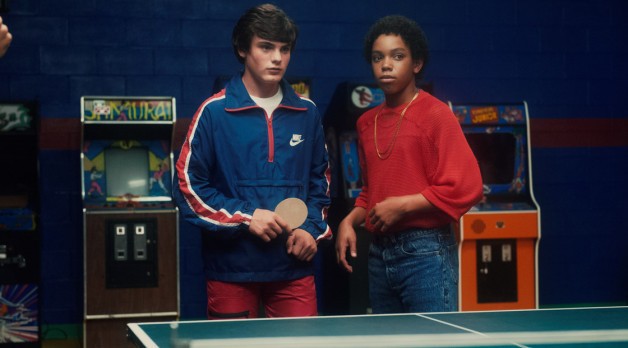
MARCELLO CONTE AND MILES MASSEY IN PING PONG SUMMER
A little coming of age movie set in the Eighties
Michael Tully's little tale of a boy about to enter ninth grade doesn't make waves or create deep emotional conflicts. Tully delivers something that succeeds on its unambitious level very well, because he plays it simple and straight. His hero is Rad Miracle (Marcello Conte), a boy who'll enter ninth grade in the fall in Mount Airy, Maryland. He and his little family are vacationing in Ocean City, Maryland. And so it comes to pass that Rad has to beat the local bully, the nasty, older and bigger rich boy Lyle Ace (Joseph McCaughtry) at a ping pong challenge staged between the two of them at the all-important teen center, the "Fun Hub." Lyle and his even nastier chunky redheaded sidekick Dale Lyons (Andy Riddle) deliver a little dose of humiliation to Rad every time they come across him. But what's surprising is how easy everything is for Rad. He's not into making waves. If you enjoy this movie, it will be because you like looking at the cute boys (especially the adorable, rosy cheeked Marcello) and girls (especially his would-be love, putative cocaine addict and former Lyle girlfriend Stacy Summers (Emmi Shockley) and admiring their Eighties clothes, listening to their Eighties music, watching them do their Eighties things. Rad isn't just into ping poing; he works on his break dancing moves all the time, as does his new best friend Teddy Frye (Myles Massey), who brings his dad's giant boom box to the beach, and the outfits and hairdos are to be savored in every scene. Though this aspect never takes over, Ping Pong Summer is as much as anything a quiet celebration of American pop history. Some of the cast come from Maryland, and the movie shows all the iconic locations and joints for those who have memories of summers at the eastern shore resort: Tully is looking at his own past through rose-colored glasses here.
Not least of the movie's achievements, Tully manages, if only briefly, to make table tennis seem exciting and suspenseful. For the finale is a sporting event: a ping pong challenge in which Rad must try to beat Lyle, one-on-one, before a full Fun Hub audience. Typical of the way the underdog isn't having it really all that hard at all, Rad has plenty of support at the challenge match. In fact he seems to have a bigger claque on hand than the not-so-popular Lyle. In the forefront is his family, his mom (All the Right Movies' Lea Thompson), benevolent Irish Dad (John Hannah), and goth older sister Michelle (Helena May Seabrook), who's on the way to become more cheerful and mainstream and fully cheers Rad on. Essential to Rad's edge in the match is the surprise help he gets from the outcast neighbor Randi Jammer (Susan Sarandon), who turns out to have been a ping champion in her time and gives Rad some last minute Karate Kid-like coaching. One would like to say this relationship is interesting, but both the part and the performance of Randi are sketchy. But we accept this device because it's a convention of it fits, like everything else.
It's impossible to dislike the handsome and classic-featured Marcello Conte as Rad. He is such eye-candy he has only to walk around on camera; but his part is too neutral and underwritten. Granted male teens are notoriously enigmatic. But except for some tears when he's had the opportunity to kiss Stacey on the beach at night and blows it (while Teddy's striking out similarly at another location), Rad rarely registers emotion. Example: when Randi appears and calls Rad over mid-match and asks him what he's doing, he mumbles, "Losing, I guess," as if he were a mere spectator of his own life. Is this the zen of ping pong?
Miles Massey, whose talking just like a white boy is unexplained by his more ethnic black dad, is a cheerful, lively element that's underused. So is the goth sister. And the aunt (Amy Sedaris) and uncle (Robert Longstreet) to whom the Miracles pay an obligatory visit with obligatory crab feast -- tough to be confronted by a table piled high with dead crabs if you're timid, or a vegetarian -- are a bit too extreme and even repulsive for this movie's otherwise gentle comedy style. For some reason -- flawed publicity? -- summaries of this movie repeatedly describe Rad as 13, but if he were that age and about to enter ninht grade, he'd have to have been four years old when he started grade school. The actor's looks make him more like 14 or 15, which he should be. The way Stacy immediately eyes him with interest seems strange since at times she looks like she could be his young mother. However, flawed though it may be, Ping Pong Summer does right what it does, which makes it gentle, unchallenging, and sweet without ever being clichéd or saccharine. But equal to or even much like a classic Eighties film this is not.
Ping Pong Summer, 92 mins., was produced with aid from the San Francisco Film Society Kenneth Rainin Foundation and debuted at Sundance January 2014. Screened for this review as part of the San Francisco International Film Festival of 2014 (24 Apr.-8 May). Released in theaters and on VOD Friday, June 6, 2014.
Last edited by Chris Knipp; 08-28-2014 at 11:46 PM.
-
THE DUNE (Yossi Aviram 2013)
YOSSI AVIRAM: THE DUNE (2013)

NIELS ARESTRUP AND GUY MARCHAND IN THE DUNE
Crossed paths, lost links
The relaxed, beautifully constructed film The Dune, the auspicious directorial debut of Israeli cinematographer Yossi Aviram, presents us with a simple concatenation of events. In the prelude before the opening titles, we see a man crossing open country on a bike. Then we see that man, Hanoch (Lior Ashkenazi, Footnote, Yossi) in Israel. He plays chess with an older friend, Fogel (Moni Moshonov), and, seeming lost and distracted after breaking with his pregnant wife Yaël (Dana Adini), sets off from his bike shop with a bike and a big bag on his back. As the film proper begins, Reuven Vardi (Niels Arestrup, The Beat My Heart Skipped, A Prophet) , of the missing persons department of French police, confronts Moreau (Matthieu Amalric, in a cameo), a writer who has run away from his life. The attempt to get this man to return to his wife and kids fails; Moreau commits suicide while Reuven is waiting to take him to dinner. Feeling like an aging burnout, Reuven is back in Paris with his longtime lover Paolo (Guy Marchand, Cousin, Cousine, Coup de Torchon). The whim of the owner's son will force them to move from their familiar apartment. Meanwhile, a young pregnant woman called Fabienne (Emma de Caunes) finds a man unconscious on a river bank, unable to say who he is. Reuven is called on but refuses to take on the case, believing himself finished. But this is a coincidence, a big one. Jay Weissberg, reviewing The Dune at San Sebastien for Variety, called it "an uncommon film of great sensitivity," and remarked that Aviram "proves exceptionally gifted with his stellar cast, whose nuanced performances find gold in the spare script." Very true. What a pleasure to watch Arestrup and Amalric, two of the best French film actors of the last 20 years, acting together, even if for only a few minutes.
Paths gradually and inexplicably cross. Hanoch is wandering in Paris, trailing Reuven. Then he is found by a dune, with nothing but a clipping about Moreau. The man, who we realize is Hanoch, does not speak. No one is looking for him, he has no identification. Reuven is depressed after his failure with Moreau and retires early, but his boss Audiberti (Jean-Quentin Châtelain) lures him back for for that classic, one last case. And it's a tough one. But he cracks it.
The silence of Hanoch is emblematic of a film in which people speak with their presences and their faces, Arestrup's and Ashkenazi's most of all. Ashkenazi's expressions, which have a soulful machismo that reminded me of the great Vincent Lindon, are of an old sadness being awakened. Arestrup's express a noble, elegant weariness. As Weissberg says, the meandering, mysterious, suggestive film is anchored by the solid relationship between the two gay men, Reuven and Paolo; and also by the limpid images of cinematographer Antoine Heberle. Even in its first few moments, in a brief role, speaking only a few words, Dana Adini quickly establishes the sophistication of this film with her naturalness and air of intelligence. This is an example of how well a movie can work that's delicate and suggestive, weaving its lived-in scenes and convincing cast into a melding of mood and quiet revelation.
The Dune/La dune, 85 mins., in French with some Hebrew, debuted at Haifa and San Sebastien. Release in France 13 August 2014. Screened for this review as part of the 2014 San Francisco International Film Festival (24 Apr.-8 May).
Last edited by Chris Knipp; 08-29-2014 at 02:18 AM.
-
SOUTH IS NOTHING (Fabio Mollo 2013)
FABIO MOLLO: SOUTH IS NOTHING (2013)
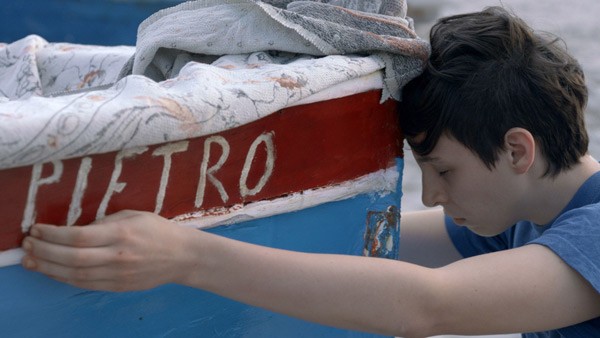
MIRIAM KARLKVIST IN SOUTH IS NOTHING
Mafia pressure leads to heavy brooding in this youthful debut
This moody, impressionistic Italian debut features a rebellious tomboy in Reggio Calabria who eventually learns that her fish vendor dad has been targeted by the Mafia. The relentlessly plain 17-year-old Grazia (the Italo-Swedish Miriam Karlkvist) gets lots broody silent moments. The filmmaker likes showing her swimming underwater; one of the times she seems to have seen the ghost of her missing brother. Her father Cristiano (Vinicio Marchioni) has a shop selling dried cod. Then the local Mafia boss drops by with a present and a firm recommendation: sell your shop (to the Mafia that is) and leave with Grazia for the North. He is noncommittal and ambivalent. He wants to resist, but the very fact of this situation makes him want to get out as soon as Grazia passes her state exams. There's the superstitious grandma, Cristiano's mom. There's a brother, Pietro, whom Grazia seems to worship, judging from how she treats his rowboat like an altar. He is gone. There is a religious service where he's remembered which for some reason grandma skips. It turns out his absence is mysterious. Grazia thinks she has seen him in a traveling carnival talking to Carmelo, (Andrea Bellisario), whom she therefore befriends, roughly, and they seem to bond. After half an hour we may begin to wonder why these people are so sullen and abrupt? The style can be grating at times; but Mollo follows through with conviction and good moments save this from being a mere exercise in Italian miserabilism. The actors are committed and Karlkvist, who acts her head off even if it's awfully one-note, got a European shooting star award for her performance.. Mollo doubtless knows what he is doing, but if yone looking for action or payoffs you'll walk out after the first reel. Mollo wants to make us uncomfortable, and at the same time, to enchant us. It's a tough game.
An effective contrast is achieved with a big city-wide religious festival with a giant heavy shrine topped with a gold crown, masses of men garbed in red, ecclesiastics in white robes, crowded streets, and fireworks. The warm earth tones of this authentic night footage into which Grazia is woven contrast with the blue-tinged action that's come before as if to say Grazia and Cristianio's world exists on the lifeless fringes of the pulsing heart of Calabria, where it's the Mafia and the Church that make everything happen.
This film hasn't so much a plot as a series of pouty gestures. Cristiano and Bianca (Valentina Lodovini), of the shop across the way, don't have a realtionshiop: she just grabs a couple of kisses and he pushes her away. Cristiano doesn't make a conscious decision about the Mafia pressure: he just grabs two sets of keys and smacks them down on a counter top.
Grazia and later even Cristiano seem to see the missing Pietro (Giorgio Musumeci), though Cristiano tells Grazia "they shot him." What did happen to him? Maybe the Mafia "disappeared" him for some reason. We never know. The mood of anger and despair paralyzes the action. Grazia seems incapable of answering a single question at her orals, so passing her exams isn't in the cards. Carmelo develops a physical attraction to Grazia, which she rejects, but eventually they do get it on in Pietro's boat, making the event feel almost incestuous. Cristiano has turned the keys over to the Mafia boss's wife, but Grazia is unwilling to leave. What will happen to them? We never know. Things slide from brutal fact into comforting (but unconvincing) magic realism and the screen fades to black.
The cinematographer Debora Vrizzi and director and other members of the film crew are recent graduates of the Centro Sperimentale di Cinematografia of Rome, as is first-timer Andrea Bellisario. The film has an air of experimentalism and youth about it.
South Is Nothing/Il Sud è niente, 86 mins., in Italian, debuted at Toronto Sept. 2013 and has shown at big fests, Rome, Berlin, Tokyo. Is was screened for this review as part of the 2014 San Francisco International Film Festival (24 Apr.-4 May). Also included in the Open Roads: New Italian Cinema series at Lincoln Center, June 2014.
Last edited by Chris Knipp; 08-29-2014 at 02:16 AM.
-
THE AMAZING CATFISH (Claudia Sainte-Luce 2013)
CLAUDIA SAINTE-LUCE: THE AMAZING CATFISH/LOS INSÓLITOS PESCES GATO

ALEJANDRO RAMIREZ-MUNOZ AND XIMENA AYALA IN THE AMAZING CATFISH
Togetherness, sought by an outsider
The premise of the Mexican director Claudia Sainte-Luce's debut is that Claudia (Ximena Ayala), an exceptionally lonely, isolated young woman, meets a sick lady and her family when she's in the hospital to have her appendix removed, and she latches onto them for the company she's never had. Given that Martha (Lisa Owen), her hospital neighbor, is seriously ill, and there is no father around, and at least two of the kids are school age, one a mere tyke, Claudia comes in handy at times staying with Martha at the hospital, since she is constantly in and out, or accompanying the pretty Mariana (Andrea Baeza) and little Armando (Alejandro Ramírez-Muñoz) by bus to school. Fat-girl Wendy is insecure and a little angry. "Why do you stay with us?" she asks Claudia, "Because it makes you happy?" Most responsible is Ale (Sonia Franco), 25, the eldest daughter. Catfish is about the busy energy of the four siblings as they interact with each other and with their mom -- who despite her condition, always has a weary smile and a positive attitude, which they all could use, especially Claudia. This is a claustrophobic tale, and as Jay Weissberg of <a href="http://variety.com/2013/film/reviews/the-amazing-catfish-review-locarno-film-festival-1200579122/">Variety</a> wrote at Locarno, if you find the family charming the film may strike you as sweet and touching, but if they only seem kooky -- or perhaps a sad mess -- you will reject everything.
To do Sainte-Luce credit, she doesn't make anything too simple, and every little scene has a distinctive texture, even though she never tells us much about her protagonist. Claudia only tells Martha privately (the children are not to know) that she has been "alone" since the age of two, when her mother died, and knows nothing of her father. How she was raised and how she came to be working in a large supermarket, how she has lived up to now, is a mystery, and there isn't much depth to the children either. Ale is rarely heard from; she has too much responsibility to talk about herself. (And yet the madness of the family, its tendency to go off in wrong directions, shows that it lacks firm guidance.) Armando is just a cute little kid. Mariana just thinks of her hair and makeup. Wendy has a "healing" class, and of course body issues; but she is a presence, a big presence. Martha has had three men in her life. These are not profound revelations. The real subject is the group dynamic, and how for Claudia, who has been so utterly deprived, this dynamic can seem incredibly warm and enveloping even though nothing here is easy, and tragedy is coming, since Martha will die, infected with a fatal illness she got from the last, best man in her life, who died of it himself years before.
The busy craziness of a family is best captured in the early scenes, when they pick up Claudia, walking home after her operation, and Claudia can't seem to pull herself away from their cluttered house and nonstop bantering, tussling talk. With some difficulty Sainte-Luce juggles the story line of Claudia's job with that of the family with their various chores -- taking Martha to and from the hospital, staying with her there, minding the younger kids. Armando's job is doing the laundry and washing up, which of course he doesn't always remember to do: he's just a kid. What exactly is happening with Claudia's job? She's demoted to selling from a cart and being paid only by what she sells at the market, punishment for missing too many days when she got caught up in the family's life after her appendectomy. Christmas is coming, and a whole sequence of a Christmas party at work that Claudia takes Mariana and Armando to, with Mariana getting drunk on rum, is well done and adds flavor, yet seems also somewhat irrelevant.
Something more decisive has to happen, and Martha, languishing in the hospital yet still a warm spirit, insists they all need a vacation. So despite objections from Ale, they all go to the beach for a couple of days, leading to a Little Miss Sunshine shot by the roadside with their shiny little yellow VW bug piled high on the roof with baggage; and Armando has brought the fish Claudia has given him. They bury Martha in the sand, dodge sunburn and mosquito bites, end the day with a merry picnic dinner -- till it's all cut short when Martha becomes very ill and they must drive back. This is where Armando, alone with Claudia, very justifiably cries. If there has been an allusion to Little Miss Sunshine it's a reminder that this movie is far more sentimental and sad.
But Catfish maintains a lively rhythm, that hustle and bustle poor Claudia finds so comforting as an antidote to her previously empty and joyless life. (She has to learn to laugh; but as Martha points out, she doesn't even smile.) Sainte-Luce, whose subtly feminine point of view is clear -- the only male is a little boy, has lucked out with the illustrious French cinematographer Agnès Godard as her d.p., who brings subtlety and beauty to every shot. The sound design is sometimes allusive and surprising, but understated, and there is hardly ever any music: the voices of the girls provide their own music.
The Amazing Catfish, Los insólitos pesces gato, 85 mins., debuted and won the Youth Prize at Locarno, and was included in the Discovery section at Toronto, with some other festivals following. There has been a theatrical release in the Netherlands and is coming in Germany and France 8 and 28 May 2014 respectively. Screened for this review as part of the San Francisco International Film Festival, 24 Apr.-4 May 2014.
Strand Releasing will bring out this film 13 June 2014 in New York at the Village East Cinema. 20 June 2014 in Los Angeless. DVD (Strand Releasing) in the US 29 July 2014.
Last edited by Chris Knipp; 08-29-2014 at 02:15 AM.
-
THE RECONSTRUCTION (Juan Taratuto 2013)
JUAN TARATUTO: THE RECONSTUCTION/LA RECONSTRUCCIÓN (2013)
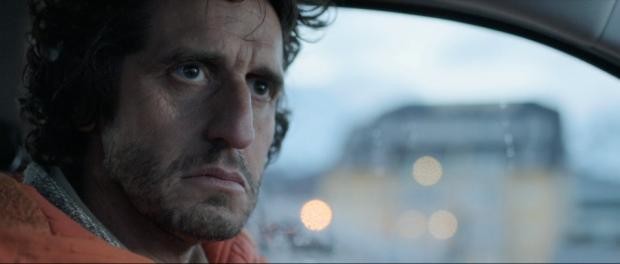
Rising to circumstance
Taratuto's The Reconstruction is the austere, tight-lipped portrait of a man's late-blooming moral and emotional rebirth, revolving wholly around the appealingly haggard, bird-beaked actor Diego Peretti. It's all the more remarkable since these two have formerly collaborated only on light, talky romantic comedies like the 2004 It’s Not You, It’s Me and the 2007 Who Says It’s Easy? And these were set in the pair's native Buenos Aires, whereas this new film takes them out of their comfort zone into the nether regions of Patagonia, where a man (or a woman too) discovers what stuff he's really made of. Edoardo (Peretti) is a tough, driven, formidable oil company field boss, who travels around in the country's extreme south and makes things happen. A phone call from an old friend and work buddy is going to take him to Ushuaia, the furthermost town in Patagonia, to help out on some unspecified task, instead of taking his vacation. His friend Mario, played by Alfredo Casero, also by trade normally a comedian, among other things, a roly-polly chap who owns and runs a big shop fully of mysterious geegaws now, has a wife and two two daughters. Mario's almost as mysterious as Edoardo. Eventually we learn why.
Before Edoardo gets down there to see Mario and his family, the film deftly paints a portrait of what he's like now. He is so heedless and brutal he drives by a young woman out on the road, evidently the survivor of a bad car accident, wildly gesturing and calling for help. He's brusque with associates, showing zero charm and replying only when necessary, though when he does speak, what he says is quite routine and does the job. With Mario's family, Edoardo is almost comically oddball. He keeps his fingerless gloves on even at the dinner table, and eats meat and salad with his hands. Mario's wife Andrea (Claudia Fontan, in a strong performance), and two daughters, insecure teenager Cata (Eugenia Aguilar) and Ana (Maria Casali) -- who've all seen him before, it turns out much later, but so long ago the girls were too small to remember -- aren't exactly impressed. One daughter calls his way of eating "gross." But Mario says he needs somebody to take over his business while he goes in for something medical he doesn't specify, a "difficult test," and he's convinced Edoardo is the only one who can do this for him, so he tells Edoardo. And this the women accept.
Who are these men? We never quite fully know. But somehow the unique frontier country of Patagonia suits them both. And somehow Patagonia is an environment in which distinctive cinema can bloom, as amply demonstrated by the films of Carlos Sorin. Mario is as warm and embracing -- he adores his daughters and treats them like miraculous little girls -- and ebullient and welcoming as Edoard is cold and craggy. Yet they both have in common this silence and mystery that's both off-putting and reassuringly macho. Edoardo's an oddball and it's obvious he must have some deep wound in his past. But his peculiarity is also assurance that convention won't ever keep him from being strong and doing what needs to be done. But what happens with Mario's test is a test for him too.
We know what's coming: something radical that will shake Edoardo out of his shell and reawaken his inner humanity. Circumstances and challenges are going to give a shut-down man a second chance at life. We just don't know exactly how it's going to come. The beauty of Taratuto and Peretti's collaboration (very much one, since they coscripted the film) is not the "what" of the story but the "how," its confident style, born out of Peretti's innate physicality and the cold beauty of the snowy Patagonian winter landscape. Visuals are fine here, with many closeups on Peretti telling all that needs to be told. Notably two delicate shots, both through curtains, first in a hospital room, then in a shower, show how very fine and subtle the vision is here, and how quietly and elegantly it knows how to tease out profound emotion. The payoffs are simple too, hugs, a smile, a phone call. But they're like springtime after long winter.
The Reconstruction/La reconstrucción, 93 mins., debuted at Venice (see Hollywood Reporter's favorable review by Jonathan Holland: he knows the earlier comedies, which I don't). It won awards at Havana (best actor), Valladolid (FIPRESCI), and Abu Dhabi (beest actor), Flanders Latin American Festival (best actor), and nominations elsewhere for best actor, actress, direction, editing, cinematography, art direction. Screened for this review as part of the 2014 San Francisco International Film Festival (24 Apr.-4 May).
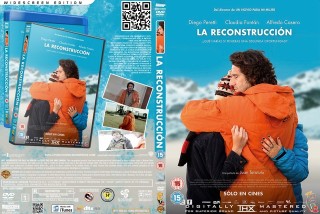
Last edited by Chris Knipp; 08-29-2014 at 02:01 AM.
 Posting Permissions
Posting Permissions
- You may not post new threads
- You may not post replies
- You may not post attachments
- You may not edit your posts
-
Forum Rules






 Reply With Quote
Reply With Quote






Bookmarks